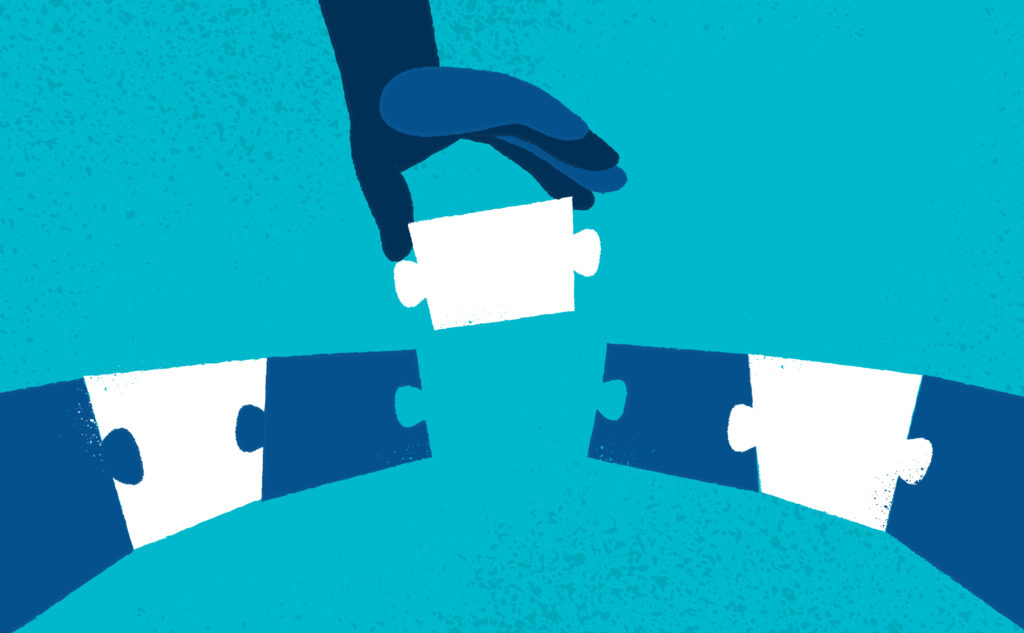timely, open, quality data are more essential than ever. As we confront the cascade of challenges from Covid-19 to climate emergencies, we rely on data to understand what we face, guide our response and track progress
António Guterres, UN Secretary-General (2017 – )
A sustainable open data ecosystem is a vision to strive for
The Open Knowledge Foundation (OKF) defines open data as ‘data that can be freely used, modified, and shared by anyone for any purpose’. The UN Secretary-General, António Guterres, in his opening speech of the UN World Data Forum 2021, emphasised that ‘timely, open, quality data are more essential than ever. As we confront the cascade of challenges from Covid-19 to climate emergencies, we rely on data to understand what we face, guide our response and track progress’. There are numerous potential benefits of open data in the academic literature, including stimulating innovation, improving business processes, enhancing transparency, and empowering citizens [8]. Open data can also improve the reproducibility and dissemination of scientific research [13].
Unfortunately, despite promises of open data, there are several shortcomings in the current open data systems. Notably, data that is made open does not meet users’ needs and is not reused widely [3]. Other weaknesses include the lack of data skills, clarity concerning data licenses, and appropriate software to process data [8,9,18]. Consequently, several practitioners and researchers advocated for open data ecosystem. Instead of top-down interventions, as typically carried out for open data infrastructures, intervention strategies for open data ecosystems should be about community building as actors in open data ecosystems are autonomous and equal partners [3].
Rufus Pollock, the founder of the Open Knowledge Foundation, emphasised the creation of feedback loops [14]. He noted that the current open data model is a ‘one-way street’ with data providers sharing data yet there is ‘no sharing of data back to publishers and no sharing between intermediaries’. He advocated for an open data ecosystem view in which ‘infomediaries — intermediate consumers of data such as builders of apps and data wranglers — should also be publishers who share back their cleaned/ integrated/ packaged data into the ecosystem in a reusable way’.
In 2021, van Loenen and colleagues proposed a research agenda for a sustainable open data ecosystem [11]. According to them, a sustainable open data ecosystem is (1) user-driven (open data supplied matches the demand by users of different categories and domains), (2) circular (all actors mutually create and capture value), (3) inclusive (all stakeholders are incentivised to contribute data and participate in the ecosystem processes), and (4) skill-based (appropriate data skills and competencies are applied).

Open data intermediaries bridge various actors in the open data ecosystem (image: Freepik.com)
More studies on open data intermediaries are needed
Open data intermediaries play an important role in an open data ecosystem. One of the key aspects of a sustainable open data ecosystem is the effective flow of resources (which can be data, software, or infrastructure) [2], and open data intermediaries serve as the facilitator in ensuring the flow of those resources. The role of open data intermediaries is instrumental not only in the use of but also access to open data [2,7]. For example, in the use of open data, open data intermediaries help to improve the data skills of potential users [16] and simplify complex data into digestible information [5] whereas, in the access to open data, they compile data from various open data sources and republish it in a one-stop platform for other users’ convenience [17]. Open data intermediaries also connect sub-segments of the open data community [12].
In 2016, Davies & Perini singled out open data intermediaries as one of the priority areas for open data research [4]. As they put it, ‘without being clear on the nature of open data, the technologies employed, or the intermediaries active, building coherent, practical and theoretical understandings of benefits, risks and relevant approaches to open data remains extremely challenging’. Nevertheless, half a decade later, in-depth studies on open data intermediaries remain lacking.
Within the limited studies, they are found to face several challenges that may undermine their potential contribution to the sustainability of open data ecosystem. For example, lack of financial planning [6], over-reliance on volunteers [15], and difficulty in securing data experts [1]. Some of these challenges are associated with the lack of development of open data intermediaries’ business models [10,15].
Hence, the ODECO research project of ESR15 (Ashraf Shaharudin) aims to respond to an acknowledged problem in the open data research: while open data intermediaries are considered crucial in the open data ecosystem, the development of their business models remains lacking. This development is important to overcome the challenges they currently face and ensure they produce the required impacts for a sustainable open data ecosystem.
[1] Alexander Andrason and François van Schalkwyk. 2017. Opportune Niches in Data Ecosystems: Open Data Intermediaries in the Agriculture Sector in Ghana. Social Science Research Network, Rochester, NY. DOI:https://doi.org/10.2139/ssrn.2949722
[2] Sumandro Chattapadhyay. 2013. Towards an expanded and integrated open government data agenda for India. In Proceedings of the 7th International Conference on Theory and Practice of Electronic Governance, ACM, Seoul Republic of Korea, 202–205. DOI:https://doi.org/10.1145/2591888.2591923
[3] Tim Davies. 2011. Open Data: Infrastructures and ecosystems. (2011).
[4] Tim Davies and Fernando Perini. 2016. Researching the emerging impacts of open data: revisiting the ODDC conceptual framework. The Journal of Community Informatics 12, 2 (June 2016). DOI:https://doi.org/10.15353/joci.v12i2.3246
[5] Patrick Enaholo and Doyinsola Dina. 2020. Journalists and the intermediation of open data: A Nigerian perspective. In Situating Open Data: Global Trends in Local Contexts. African Minds, Cape Town, South Africa, 31–49. Retrieved from https://www.africanminds.co.za/situation-open-data-global-trends-in-local-contexts/#:~:text=Open%20data%20and%20its%20effects,focus%20on%20its%20situated%20use.
[6] Miguel Angel Alor Flores. 2020. Creating public value with open government data in Latin America. Master’s thesis. Westfälische Wilhelms-Universität, Münster.
[7] Felipe González-Zapata and Richard Heeks. 2015. Understanding Multiple Roles of Intermediaries in Open Government Data. Negombo, Sri Lanka.
[8] Marijn Janssen, Yannis Charalabidis, and Anneke Zuiderwijk. 2012. Benefits, Adoption Barriers and Myths of Open Data and Open Government. Information Systems Management 29, 4 (September 2012), 258–268. DOI:https://doi.org/10.1080/10580530.2012.716740
[9] Peter A. Johnson, Renee Sieber, Teresa Scassa, Monica Stephens, and Pamela Robinson. 2017. The Cost(s) of Geospatial Open Data. Transactions in GIS 21, 3 (2017), 434–445. DOI:https://doi.org/10.1111/tgis.12283
[10] Fotis Kitsios, Maria Kamariotou, and Evangelos Grigoroudis. 2021. Digital Entrepreneurship Services Evolution: Analysis of Quadruple and Quintuple Helix Innovation Models for Open Data Ecosystems. Sustainability 13, 21 (January 2021), 12183. DOI:https://doi.org/10.3390/su132112183
[11] Bastiaan van Loenen, Anneke Zuiderwijk, Glenn Vancauwenberghe, Francisco J. Lopez-Pellicer, Ingrid Mulder, Charalampos Alexopoulos, Rikke Magnussen, Mubashrah Saddiqa, Melanie Dulong de Rosnay, Joep Crompvoets, Andrea Polini, Barbara Re, and Cesar Casiano Flores. 2021. Towards value-creating and sustainable open data ecosystems: A comparative case study and a research agenda. JeDEM – eJournal of eDemocracy and Open Government 13, 2 (December 2021), 1–27. DOI:https://doi.org/10.29379/jedem.v13i2.644
[12] Viktor Mayer-Schönberger and Zarino Zappia. 2011. Participation and power: Intermediaries of open data. Alexander von Humboldt Institut für Internet und Gesellschaft (HIIG), Berlin, Germany. Retrieved January 28, 2022 from https://www.hiig.de/wp-content/uploads/2017/08/participation_and_power.pdf
[13] Jennifer C. Molloy. 2011. The Open Knowledge Foundation: Open Data Means Better Science. PLOS Biology 9, 12 (December 2011), e1001195. DOI:https://doi.org/10.1371/journal.pbio.1001195
[14] Rufus Pollock. 2011. Building the (Open) Data Ecosystem. Open Knowledge Foundation blog. Retrieved May 12, 2022 from https://blog.okfn.org/2011/03/31/building-the-open-data-ecosystem/
[15] Luigi Reggi and Sharon Dawes. 2016. Open Government Data Ecosystems: Linking Transparency for Innovation with Transparency for Participation and Accountability. In Electronic Government (Lecture Notes in Computer Science), Springer International Publishing, Cham, 74–86. DOI:https://doi.org/10.1007/978-3-319-44421-5_6
[16] Ayoung Yoon, Andrea Copeland, and Paula Jo McNally. 2018. Empowering communities with data: Role of data intermediaries for communities’ data utilization. Proceedings of the Association for Information Science and Technology 55, 1 (2018), 583–592. DOI:https://doi.org/10.1002/pra2.2018.14505501063
[17] Andrew Young and Stefaan Verhulst. 2017. Aclímate Colombia: Open data to improve agricultural resiliency. GovLab – Open Data’s Impact. DOI:https://doi.org/10.1007/978-3-319-63743-3_6
[18] Anneke Zuiderwijk, Marijn Janssen, Sunil Choenni, Ronald Meijer, and Roexsana Sheikh Alibaks. 2012. Socio‑technical Impediments of Open Data. Electronic Journal of e-Government 10, 2 (December 2012), pp156‑172-pp156‑172.
Author:
Ashraf Shaharudin
Delft University of Technology, Netherlands



